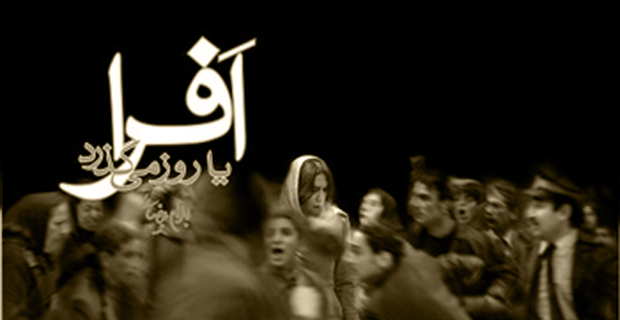
Afra, or the Day Passes by Bahram Bayzayi (b. 1938), the prolific Iranian screenwriter, playwright and director, was published in 1998 but was only premiered in 2009. It turned to a very successful performance which was warmly welcomed by the audience. The play is divided to no acts and no scenes; it just starts with every character giving an account of what is happening and also very brief references to the past. It, then, moves to their interactions and its aftermath. Every character introduces himself or herself at the beginning.
The main focus of the play and its protagonist is Afra, a teacher, and her family consisting of mother, Borna, in the 5th grade primary school and a student of Afra, and Manda, the baby of the family. Their father who as we learn had been a policeman was martyred in an offensive. They are leading a very difficult life mainly due to financial problems. Afra and her family along with almost 10 other families are living in an old house which has once been a part of Shazdeh Badrolmolouk’s house, and which she has divided to small suits so that she can make a profit out of it. She is a remainder of the once-royal family, the Qajar, and now claims that the entire place belongs to her and her family.
She also has a son, Shazdeh Cholman Mirza, living with her. He is in his 20s or 30s but mentally no older than a five-year-old boy. The problem is that he has never been allowed to grow up. His mother has always kept him isolated. He had never been allowed to go out and play or socialize with people living around him as his mother believed birds of a feature flock together; even, he is banned from bike riding outdoors. Therefore the upshot of such an upbringing turns to become a gauche person with no social graces whom no one desires to marry and live with; hence, becoming the main concern for Shazde Badrolmolouk.
Seeking to persuade Afra to consent to marry Cholman Mirza, but to no avail, Badrolmolouk frames Afra. Consequently she becomes imprisoned which leaves her social status and job and family face at stake in the small district in which they live. To add insult to injury, Hamid Shayan who claims to be Afra’s lover and has been trying to improve his small business and increase his income gets drastically disillusioned. He distributes the money he has been saving for his wedding ceremony among Afra’s students to run everywhere and tell every single person in their district of Afra’s imprisonment and conviction, and also the fact that whatever present she gave to her student were stolen from the shop.
The policeman, Sarkar Khademi, who is going to be retired in less than a week, is absolutely perplexed in such a situation. On the one hand, feeling indebted to Afra’s father, he wants to help Afra, on the other hand, stands Shazdeh Badrolmolouk who has been his landlady for a long time and is so powerful that everyone accepts whatever she says. Finally with the help of Mr. No’e Bashari, who is the assessor, and Cholman Mirza’s confession, Afra, is released. In fact, while assessing the value of Shazdeh Badrolmolouk’s house, he hears Shazdeh Cholman Mirza confessing that he himself has stolen all the jewelry and other items from the guests’ pockets, and reveals his mother’s evil plans for the poor teacher with whom he is in love. Ironically, he believes that her mother seeks to degrade him in Afra’s mind and shatter the relationship they have and his love for him while her mother is trying to persuade Afra to marry him. At last, Afra comes back home, but they are shocked by the traumatic nature of what has happened to them especially what their neighbors did to them.
Disillusioned and exhausted someone knocks at the door; yes, he is Afra’s cousin. But how? Who cares? What counts is that he is here with them, so Afra was right; he had a cousin in deed. This very fact leaves all those who considered her a liar ashamed. Her once imaginary cousin himself says that
I received his letter [Borna’s letter]. Do you believe? For so many years you keep sending a letter with an address on it, but it never gets delivered. But this time, I received a letter without any addresses but it was really for me (90).
The play ends when the horizons of reality and illusion meet. Like its ending, the whole play features binarisms or binary oppositions around which it revolves. One of the major features of language, among other ones, on which structuralists base their ideas, is the fact that human being understands the meaning of the words in their relations to other words and mainly in opposition to other words. In other words, “relation” becomes a significant aspect of language on which structuralists focus. Relations are important for what they can explain: meaningful contrasts and permitted or forbidden combinations (Culler 14). Levi-Strauss argues that this opposition between two items seems to be a simplification while it leads to a complication as far as the difference is qualitative. If one opposes A to B and X to Y, the two cases become similar because each involves the presence and absence of a given feature, but this similarity is deceptive in that the features in question may be of very different kinds (ibid 15).
The components of a system interact and; therefore, because of their relation they form a working unit. And we perceive these components only because of their differences. Basically according to structuralism, the human mind perceives differences in terms of opposites which structuralists call binary opposition (Tyson 202). This is how the opposites, their relations and their differences become important in the perception of the structure of literary works especially among which Afra is not an exception.
The major binary opposition in the play is the reality/illusion opposition. This opposition can be considered in the play almost in relation to all of the characters. Apparently this opposition is more conspicuous with regard to Afra and her world. She is a teacher; she has to lead their life; however her mother, Afsar Khanoum also works for Shazdeh Badromolouk. As mentioned in the summary of the play, Shazdeh Badromolouk who is too worried about his son’s future seeks to make Afra marry him, but Afra cannot accept such a proposal. Therefore, she concocts her own story. She tries to force her dream upon the world. This dream is the dream of having a cousin, an engineer, who is her fiancé. From the very beginning of the play this issue is approached in a way that the reader cannot make up his or her mind as to the trueness of the existence of such a cousin. Once Afsar Khanoum is sick and is having fits of delirium she asks Afra “why isn’t there any news from your cousin?” (11). Then, Afra wonders whether or not they really have any cousins at all. As this matter turns to an obsession for Afra, she asks her students to write a letter to their imaginary cousin and tell him that their lives are passing very difficultly and they need his help. Borna, as her student, while writing his composition talks of some picture they have. The picture is so murky that one cannot distinguish the faces (27). Shazdeh Badrolmolouk does not believe Afra’s story though:
Khanoum Shazdeh: enough! We both know that there’s no such a thing as a cousin!
Afra: I said, ma’am, I got married to a cousin who is not only my cousin but one who has been a lover for so many years.
……
Afra: I said believe me ma’am. I’m awaiting him by all my heart.
Khanoum Shazdeh: hee! Just in dreams?
Afra: what’s the difference? The only important thing is that whenever I need him, he comes to help me (52).
The distinction between the opposition is sometimes shattered such as in these examples. In fact, this opposition on this level not only concerns itself with Afra alone, but also with her whole family.
TO BE CONTINUED…


Leave a Reply